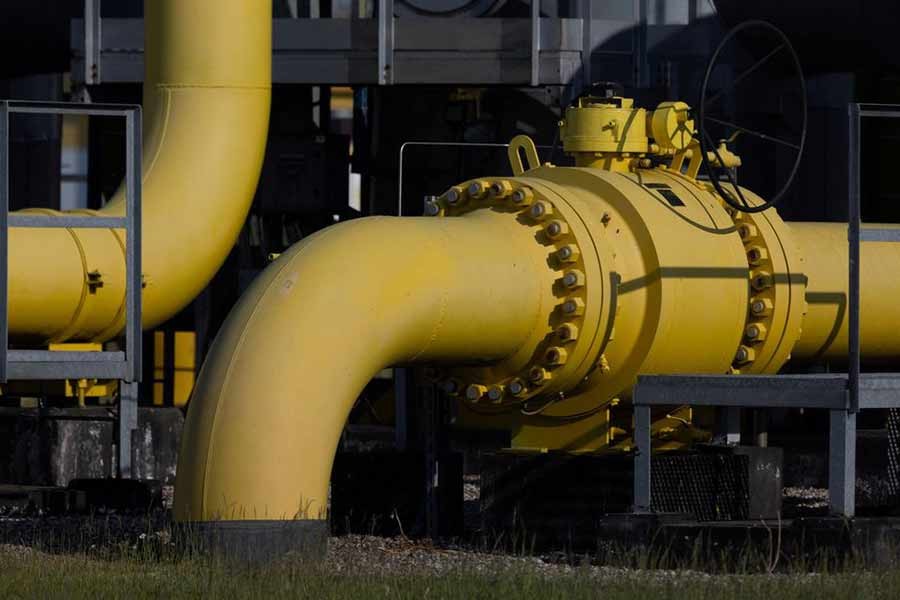A gas price cap agreed by the European Union will be easy to avoid and is unlikely to achieve the bloc's aim of reducing energy prices, analysts and market participants said.
After months of wrangling over the idea, EU countries on Monday agreed to a gas price cap that would be triggered if Europe's benchmark gas price exceeds 180 euros per megawatt hour and is 35 euro/MWh higher than liquefied natural gas prices for three days.
"We have succeeded in finding an important agreement that will shield citizens from skyrocketing energy prices," Czech industry minister Jozef Sikela said after the deal was struck.
Analysts and market participants, however, questioned whether the cap will achieve that aim.
"My view is that this likely would not transfer to savings for consumers... in some cases, it could increase prices," said Jacob Mandel, senior associate at Aurora Energy Research, pointing to various ways firms will be able to keep trading gas at prices above the cap.
'PURELY POLITICS'
One such route would be for traders to switch contracts.
The EU price cap applies to front-month, three-month and front-year contracts on the Title Transfer Facility (TTF), the main Dutch gas trading hub in Europe, but companies could shift to buying gas on intraday or day-ahead gas contracts, which will not face the EU price limit.
Companies could also move their gas trading off energy exchanges, where the EU price cap will apply, and instead conduct private transactions. The EU cap will not initially cover these "over-the-counter" (OTC) trades, although the bloc will review next year if they should be included.
Most large European consumers' liquefied natural gas (LNG) trades are already done OTC, meaning they would not be affected by the EU cap, according to estimates by SEB Markets.
"The price cap is purely politics and today we would say it is pretty much irrelevant," said SEB analyst Ole Hvalbye.
The European Commission proposed a gas price cap last month, after calls from roughly 15 countries for the measure, and resistance from a handful of others. European gas prices spiked to record highs of above 340 eur/MWh in August, the peak so far of sustained high prices driven by Russia this year cutting off most of the gas it sends to Europe.
Some analysts said the conditions that caused that spike - a plunge in Russian gas supply and little capacity to quickly replace it - are unlikely to be repeated, given the rapid expansion of Europe's LNG import infrastructure since.
Germany, Europe's biggest gas consumer, opened its first floating gas terminal on Saturday, with more to follow next year. Countries including the Netherlands and Poland are also expanding LNG infrastructure.
"We're less likely to see a situation where the TTF trades at a super high premium above the LNG price. As such, it is also making it less likely that you will see the actual cap is activated," said Sindre Knutsson, head of energy markets at Rystad Energy.
A third option to avoid the EU cap would be for traders to move to other gas markets. The EU price cap applies to EU hubs, but not those outside the bloc, such as Britain's National Balancing Point (NBP) trading hub.
The Intercontinental Exchange, which hosts TTF trading in Amsterdam, has also threatened to relocate the platform outside the EU to avoid the cap.
HIGHER COSTS
Assessing whether the cap would have prevented price spikes this year is difficult.
Front-month TTF prices met the price level required to trigger the EU cap on about 40 days this year. But the trigger also requires prices to be 35 eur/MWh above an LNG reference price comprising an average of various LNG price assessments.
The EU has tasked energy regulators with calculating that price, but only from February.
"Given the build-up in LNG infrastructure, it is difficult to see another 40 days of the cap," said Ben Wetherall, market development director at ICIS.
Aurora Energy Research said the cap's existence alone could lead to higher energy costs since by adding risk to European gas markets, it could increase the margin calls market participants are required to put down to insure trades - costs they may pass on to consumers.
Soaring energy prices have already forced European utilities and traders to secure extra funds from governments and banks to cover margin call requirements.
The EU agreed to suspend its price cap if it causes negative consequences, including a "significant increase" in margin calls.
Simone Tagliapietra, a senior fellow at think tank Bruegel, said the only way to structurally lower European energy prices would be to reduce countries' energy demand or alleviate the tight supply that sent prices soaring this year.
"This has nothing to do with the cap," he said.
Gas prices have eased since their August peak as the EU agreed on other emergency measures to curb demand and fill storage ahead of winter. EU gas demand dropped by 20 per cent in August-November this year, compared with the five-year average for the same period, Eurostat said on Tuesday.


